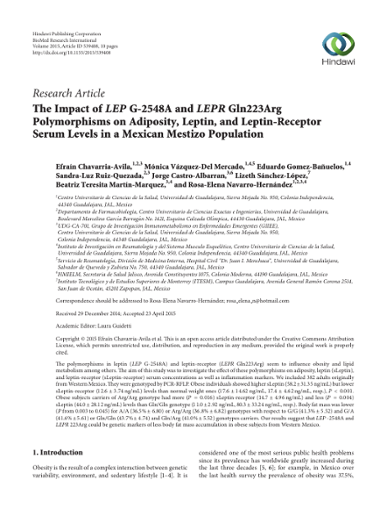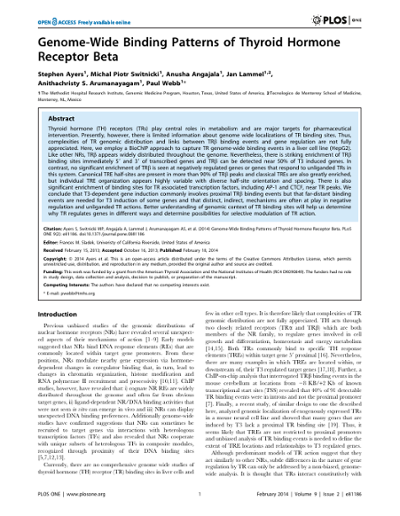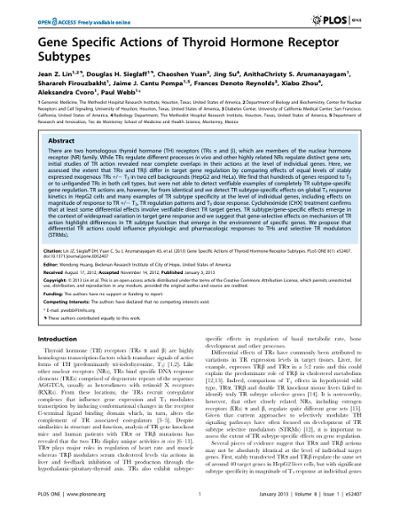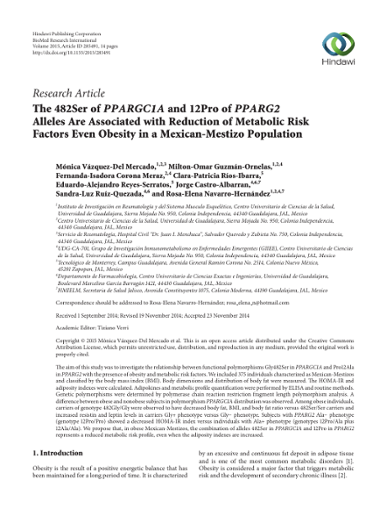| dc.creator | Lizeth Sánchez López | |
| dc.date | 2015 | |
| dc.date.accessioned | 2018-10-18T20:12:58Z | |
| dc.date.available | 2018-10-18T20:12:58Z | |
| dc.identifier.issn | 23146133 | |
| dc.identifier.doi | 10.1155/2015/539408 | |
| dc.identifier.uri | http://hdl.handle.net/11285/630344 | |
| dc.description | The polymorphisms in leptin (LEP G-2548A) and leptin-receptor (LEPR Gln223Arg) seem to influence obesity and lipid metabolism among others. The aim of this study was to investigate the effect of these polymorphisms on adiposity, leptin (sLeptin), and leptin-receptor (sLeptin-receptor) serum concentrations as well as inflammation markers. We included 382 adults originally from Western Mexico. They were genotyped by PCR-RFLP. Obese individuals showed higher sLeptin (58.2 ± 31.35 ng/mL) but lower sLeptin-receptor (12.6 ± 3.74 ng/mL) levels than normal weight ones (17.6 ± 14.62 ng/mL, 17.4 ± 4.62 ng/mL, resp.), P < 0.001. Obese subjects carriers of Arg/Arg genotype had more (P = 0.016) sLeptin-receptor (14.7 ± 4.96 ng/mL) and less (P = 0.004) sLeptin (44.0 ± 28.12 ng/mL) levels than Gln/Gln genotype (11.0 ± 2.92 ng/mL, 80.3 ± 33.24 ng/mL, resp.). Body fat mass was lower (P from 0.003 to 0.045) for A/A (36.5 % ± 6.80) or Arg/Arg (36.8 % ± 6.82) genotypes with respect to G/G (41.3 % ± 5.52) and G/A (41.6 % ± 5.61) or Gln/Gln (43.7 % ± 4.74) and Gln/Arg (41.0 % ± 5.52) genotypes carriers. Our results suggest that LEP-2548A and LEPR 223Arg could be genetic markers of less body fat mass accumulation in obese subjects from Western Mexico. © 2015 Efraín Chavarria-Avila et al. | |
| dc.language | eng | |
| dc.publisher | Hindawi Limited | |
| dc.relation | https://www.scopus.com/inward/record.uri?eid=2-s2.0-84930618830&doi=10.1155%2f2015%2f539408&partnerID=40&md5=56ed52aea3e26a1190bd3e3ef2bfee8e | |
| dc.relation | Investigadores | |
| dc.relation | Estudiantes | |
| dc.rights | info:eu-repo/semantics/openAccess | |
| dc.rights.uri | http://creativecommons.org/licenses/by-nc-nd/4.0 | |
| dc.source | BioMed Research International | |
| dc.subject | arginine | |
| dc.subject | leptin | |
| dc.subject | leptin receptor | |
| dc.subject | leptin | |
| dc.subject | leptin receptor | |
| dc.subject | leptin receptor, human | |
| dc.subject | adult | |
| dc.subject | Article | |
| dc.subject | body fat | |
| dc.subject | clinical article | |
| dc.subject | controlled study | |
| dc.subject | cross-sectional study | |
| dc.subject | fat mass | |
| dc.subject | female | |
| dc.subject | genetic marker | |
| dc.subject | genetic polymorphism | |
| dc.subject | genotype | |
| dc.subject | heterozygote | |
| dc.subject | human | |
| dc.subject | lipid metabolism | |
| dc.subject | male | |
| dc.subject | Mexican | |
| dc.subject | obesity | |
| dc.subject | population research | |
| dc.subject | protein blood level | |
| dc.subject | blood | |
| dc.subject | body mass | |
| dc.subject | genetic predisposition | |
| dc.subject | genetics | |
| dc.subject | Mexican American | |
| dc.subject | Mexico | |
| dc.subject | middle aged | |
| dc.subject | obesity | |
| dc.subject | pathology | |
| dc.subject | single nucleotide polymorphism | |
| dc.subject | Adiposity | |
| dc.subject | Adult | |
| dc.subject | Body Mass Index | |
| dc.subject | Female | |
| dc.subject | Genetic Predisposition to Disease | |
| dc.subject | Genotype | |
| dc.subject | Humans | |
| dc.subject | Leptin | |
| dc.subject | Lipid Metabolism | |
| dc.subject | Male | |
| dc.subject | Mexican Americans | |
| dc.subject | Mexico | |
| dc.subject | Middle Aged | |
| dc.subject | Obesity | |
| dc.subject | Polymorphism, Single Nucleotide | |
| dc.subject | Receptors, Leptin | |
| dc.subject.classification | 7 INGENIERÍA Y TECNOLOGÍA | |
| dc.title | The impact of LEP G-2548A and LEPR Gln223Arg polymorphisms on adiposity, leptin, and leptin-receptor serum levels in a Mexican Mestizo population | |
| dc.type | Artículo | |
| dc.identifier.volume | 2015 | |
| refterms.dateFOA | 2018-10-18T20:12:58Z | |




